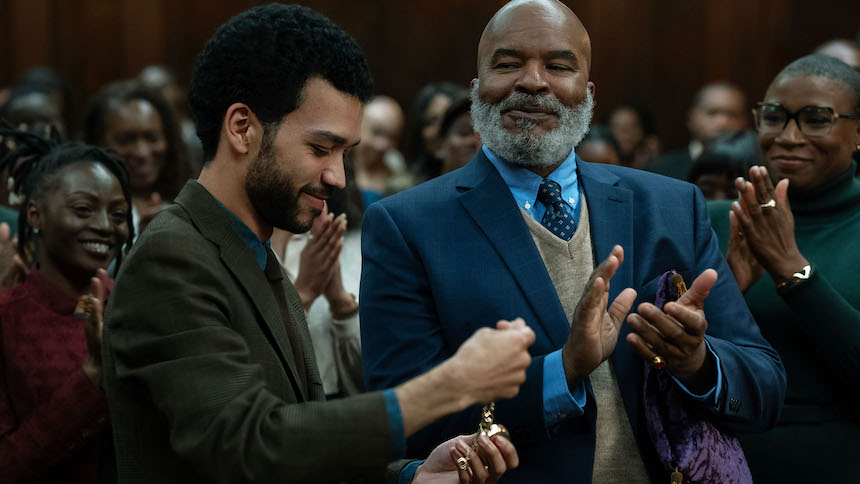Sundance 2024 Review: THE AMERICAN SOCIETY OF MAGICAL NEGROES, Surface-Deep Satire Flounders on Rom-Com Shores

Filmmaker Spike Lee generally gets credit for inserting the “magical negro” phrase into pop culture more than two decades ago, but the idea itself dates back decades, if not longer.
Coined to reflect the tradition in fiction or film of Black characters who function primarily, if not solely, as an adjunct or ancillary to a white character’s needs, the “magical negro” has been justifiably criticized, lampooned, and satirized, the product of more racist, reactionary, regressive times.
The “magical negro” concept, however, has never received the satirical treatment in fiction or film it’s so justly deserved. Unfortunately, writer-director Kobi Libii’s feature-length debut, The American Society of Magical Negroes, doesn’t — and won’t — qualify, squandering what little it has to say in the first few, episodic moments before switching into a flaccid, surface-deep satire of tech-bros and Silicon Valley, before switching again into familiar rom-com territory that undermines the implicit satire in a film not-so-subtlety called The American Society of Magical Negroes.
Modestly promising at first, the film follows Aren (Justice Smith), a struggling LA-based artist whose latest show ends in abject disappointment. A trained designer, Aren’s focus on yarn-based sculpture constructed around a vaguely articulated idea ends as it began, with zero sales, an empty bank account, and a bleak financial future. It’s almost enough for an idealist like Aren to throw away his artistic ambitions in the trash along with his yarn work and seek gainful employment as an office drone.
'Almost' is the right word as a sullen Aren, temporarily lacking the awareness typical of city dwellers, specifically non-white city dwellers, finds himself in a dangerous predicament involving a drunk white woman, a supposedly missing purse, and two white knight wannabes. Luckily for Aren, he has a black knight of his own, Roger (David Alan Grier), a waiter at the same night’s art show who happened to be on the same street as Aren.
Roger doesn’t just save Aren from white aggression; he offers Aren a deal he can’t refuse: join Roger as the latest apprentice in the mystically inclined American Society of Magical Negroes. As Roger explains it, the society exists to keep white discomfort — and with it, white anger and resentment towards people of color — in check by providing said white people with their very own Black friend, a Black friend whose sole purpose involves propping up the white client’s ego, offering timely advice (e.g., what to wear, what to say), and helping the client succeed in ways Black people can’t and won’t.
Oddly, Libii sidesteps why Aren above anyone else should be offered membership in such an exclusive, secretive society. Roger sees something “special” in the dour, slump-shouldered Aren that makes the latter both intrinsically worthy and a worthwhile candidate for membership in the society.
Libii, though, fails to convey Aren’s “specialness” beyond Roger’s approving attitude. Unfortunately, that means we’re stuck with Aren as our viewpoint character and nominal protagonist. It’s frustrating to the point of irritation because Aren — and by extension, Smith — deserves better, but then again, so does the audience.
Once trained in the ways of the society, Aren gets his first real assignment: joining a Facebook-inspired tech company facing backlash for its latest software upgrade, befriending senior designer Jason (Drew Tarver), mediocrity personified, and somehow avoiding falling in lust or love with their mutual colleague, Lizzie (An-Li Bogan). That Jason refers to Lizzie as his “work-wife” and harbors vague romantic feelings toward her complicates matters for Aren. After all, the (white) client and their needs always come first. If they don’t, Aren not only loses his sweet new gig, but something or other will happen to the society itself and its magical powers.
While the romantic comedy angle isn’t necessarily objectionable, it’s as underwritten and underdeveloped as Aren’s character, minimizing the root-worthy aspects of their relationship and its completely foreseeable resolution. Ultimately, The American Society of Magical Negroes feels like a bait-and-switch; probably because it is.
Swapping out cultural and social satire for tech satire and then all but dropping that tech satire for rom-com tropes will leave audiences feeling not just underwhelmed, but cheated as well. As they should be.
The American Society of Magical Negroes premiered at the Sundance Film Festival. Focus Features will release the film theatrically on Friday, March 8.
The American Society of Magical Negroes
Director(s)
- Kobi Libii
Writer(s)
- Kobi Libii
Cast
- Justice Smith
- Zachary Barton
- Anthony Coons







